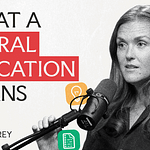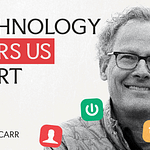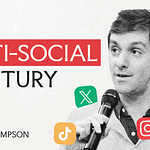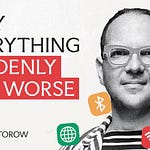Welcome to the second installment of our interview series here at The Honest Broker—also available on our new YouTube channel. Today, I’m happy to share with you a conversation with James Marriott about the reading crisis and the looming post-literate society.
If you’ve noticed that you’re reading less, or you’ve been concerned with the decline of reading as a leisure activity, or you’re wondering what happens if a culture abandons literacy, this is a conversation for you.
Please support The Honest Broker by taking out a premium subscription (just $6 per month).
James is a columnist at The Times of London and the author of Cultural Capital here on Substack. He recently published ‘The Dawn of the Post-Literate Society’, an article about the worldwide literacy crisis, which was a platform-wide sensation.
The literacy crisis is one of my interests as well. I’ve previously been interviewed on the subject alongside James at UnHerd, and I’ve released multiple YouTube videos about the subject, too.
So, I knew I needed to ask him to sit down for interview on The Honest Broker. It’s a good conversation, ranging from the rise and fall of literacy, the causes behind it (James thinks the smartphone is to blame), and what this could mean for politics.
HIGHLIGHTS FROM THE JAMES MARRIOTT INTERVIEW
Jared: James Marriott, thank you for joining me.
James: Thanks very much for having me.
Jared: You and I are both really concerned about whatever this thing is that we call the ‘literacy crisis.’ I have a lot of complicated thoughts about this, and I’ve been trying to work them out and systematize them a little bit more. So, I thought it might be helpful if we started this discussion by just asking ‘What is the literacy crisis?’
James: I guess the best way to explain what I think I’m getting at is in statistics, which show pretty consistently—in the UK, in America, and virtually everywhere—that reading is in quite severe decline. There was a survey recently in the UK that found that a third of UK adults have given up reading for pleasure. The National Literacy Trust here in the UK reports shocking and dispiriting falls in children reading for pleasure. Researchers from University College London and the University of Florida found a 40% drop in reading for pleasure in the last 20 years in America. Another remarkable thing is that there’s an OECD report at the end of last year that found that rates of literacy were falling or stagnating in the developed world, apart from Finland and Denmark.
Jared: If you know anyone in publishing, they’ll tell you that publishing’s been dying for 100 years. But this might be a real case where even people who stereotypically would have been considered the type of people who would go and read a lot—I’m thinking particularly of college graduates—have by and large abandoned reading for pleasure after they leave university.
James: There’s some really depressing research that I’ve seen from Jean Twenge, who finds that there used to be quite a significant gap between how much the best students read for pleasure and how much the worst students read for pleasure. She’s found that the gap has narrowed and narrowed and narrowed. And the most talented and the most ambitious students now read almost the same as the least talented students who have often not really read that much.
I’ve always read a lot. I was raised in a household that worshiped books. And I remember it was after I graduated from university that I realized that the other people on my English literature degree had basically stopped reading books after they graduated. I almost think this is a kind of bad thing about the expansion of higher education in that it allows people to think that education is this specific time-limited thing that happens to you. You acquire it, then you’re educated, and then the work of education stops.
Jared: There’s this great book, The Intellectual Life of the British Working Classes by Jonathan Rose. It’s the classic book about auto-didacticism, especially in the UK. You’ll read about Welsh miners who would form libraries and reading guilds, essentially, that would have circulations in the tens of thousands. There’s one man that Rose mentions in that book. His wife taught him to read when he was in his thirties, and he went on to read Nietzsche in German and the New Testament in Greek. He had gone from essentially an uneducated miner to what we would consider to be someone with a really robust intellectual life in a decade.
James: I find those stories so moving. It’s inspiring, and it is liberating in a way because reading those stories of people who are educating themselves in adverse circumstance, you can really be like, Wow, you can really read whatever you want if you put your mind to it.
Jared: Let’s go back a little bit to what exactly this crisis is. My suspicion and dissatisfaction, and an opportunity to enrich the discussion, is that it seems like the literacy crisis is not just one thing. We call it the literacy crisis, but there’s at least a couple of different things going on. We have problems with childhood education, but also reports that Gen Z parents don’t read to their children as often as Millennial parents did. There’s less of a culture of introducing your children to reading from a young age. We’ve moved to using laptops and Chromebooks in almost every classroom. We have another problem with screens and attention spans, too. Then we have the decline of reading for pleasure, which might be a distinct thing. And then we also have these worries about how literacy is somehow connected to participation in democratic politics. I find that the current discussion currently throws them all together. And you wrote this piece on Substack. I think you called it your magnum opus.
James: Ironically, I should add! I don’t know if that came across.
Jared: You didn’t say that these were all the same thing, but you treated them all as aspects of one singular problem.
James: I guess I do bundle them together in that essay into one factor. And I think that is because I basically do think there is one problem. And I think it is the transformative effect of smartphones on our culture and society. I think we’re living through the crisis of addictive screens and the dawn of the screen age.
Jared: Tell everybody about your relationship with your phone.
James: I have a dumb phone. It’s halfway between a Nokia brick and a smartphone, so it does things like WhatsApp, Spotify, and Google Maps. It’s also intolerably tricky to use. And therefore, I find it basically un-addictive. I think smartphones are designed to be addictive because technology companies want us on our screens as much as possible. But I think we now live in a world of ubiquitous screens that goes beyond just phones.
I think my ideal state of the internet actually is that little moment in the early 2000s where you have your big desktop computer in the family kitchen, and if you want to use the computer, you have to go to it, you have to sit in front of it. I’m not like anti-internet, so it has many obvious benefits. But it has its place. The ubiquity and portability of internet has really allowed it to take over our lives.
Jared: Let’s talk a little bit about this book, Orality and Literacy by Walter Ong. This is a foundational book on how literacy has transformed consciousness. Ong gives you a history of writing, a history of the development of literacy. But I think the pivotal chapter comes in the middle, and that’s on writing transforming consciousness. The way that we employ this new technology is going to change the way that we think and interact with the world and interact with each other. So if we were to abandon literacy, you might expect some devastating consequences, or at least the world would be quite different than the world we’ve become used to living in, especially in the last 500 years when literacy became a widespread phenomenon.
James: The thing I found really striking about that book was his description of the way that if you’re living in an oral culture, where all the information you have is the information you can speak, there is no way of preserving information other than remembering it. So if you want to preserve information, he says, you have to think memorable thoughts. And if you can’t remember it, it’s gone. When humanity adopted writing, we freed up enormous spare cognitive capacity because we weren’t completely devoting ourselves to memory. Writing basically gives birth to higher and more complex forms of thought, including philosophy.
Jared: I was having a conversation with Derek Thompson, which will be another episode of this podcast, and he said that everything is television. And I thought, oh, that’s like the best description I’ve heard. Even sex is television for huge amounts of young people. And so the question is: if writing transforms consciousness, how does television or broadcast transform consciousness? What do we lose when we move towards rapidity and breadth over slowness and depth?
But let me pull up a quote here from Mary Harrington:
The end of print culture is already upon us. With its end, we are already witnessing the disintegration of modernity’s load-bearing foundations, including the valorization of facts and objectivity, and a conception of the individual subject as a universal model of human personhood. This reality-picture, which crystallized in the seventeenth century, is already well on its way to dissolution in the solvent bath of digital media, a process radically accelerated by the spread of AI.
It is perhaps too neat to say the transition from print to digital forces us to replay the seventeenth century again, but in reverse. And yet much that is happening today makes sense, seen in those terms. And perhaps its most momentous effect is to undermine the cultural norms and habits of thought that form the bedrock of modern liberal democracy.
James: I agree with a lot of what you just read out. How much of that do you buy?
Jared: I think we have to think about the other cultures that emerged with print as well. You mention this very briefly in your piece, but we wouldn’t have the Russian Revolution without literacy as well. And that was not a triumph of liberal individualism. Literacy was well over, or at least approaching, 50% when both the French and Russian revolutions occurred. What I’m questioning is the close link between literacy and liberal individualism.
James: This is the hard thing about this argument to get across, which is that I don’t think you can make a population literate and automatically get democracy. I would describe literacy as a necessary but not sufficient condition for democracy. We live in a complex world. People who obsess over communications technologies are often accused of being technological reductionists. It’s very easy to fall into, and I perhaps sometimes risk it.
Jared: But wait—couldn’t they say you’re being a technological reductionist, not about literacy but about smartphones?
James: Yeah, and I think that is a criticism I have to anticipate. I’m not a technological reductionist, but I am, you might say, a technological ‘importantist.’
Jared: The kind of vision that you’re hoping to preserve then is a liberal democracy that’s coupled with very strong elite institutions. Is that right, or am I being unfair?
James: That’s true. And it sounds a little elitist or unpleasant. Obviously, there’s a lot wrong with a system that only allows certain people to speak. I come back to the idea that there’s no perfect system. But I do think that information hierarchy where experts generally had more of a voice probably works better than the system we have now.
Jared: Where do you think you and Mary Harrington are coming apart?
James: I think a lot of her analysis is very sound. I feel her pessimism about democracy. I think she seems to suggest that we might need a king in the age of the screen to control society. I find that very unpleasant. I hope there is a way to salvage democracy. I don’t want to be completely blackpilled about democracy.
Jared: James, I think this is going to be a conversation that you and I will have many times in the future. I’m sure we’re going to be writing about this. But let’s end with a book recommendation for the audience. I guess this is our own way of sort of fighting for literacy. What do you have for us?
James: In Pursuit of Civility by Keith Thomas. I’m slightly obsessed with the 18th century. In my view, it’s the most important century in modern history. Keith Thomas is arguably the most important and respected historian in England. He’s very interested in what’s weird about the past and what’s strange about the past.
Jared: James Marriott, thank you for joining us.
James: Thanks very much.








